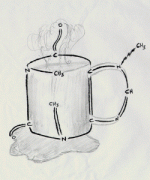The Origin of Coffee in the Consulate of Kashgar, Xinjiang
British Consulate in Kashgar

Catherine Martney, wife of the British Consul General in Kashgar, is a brave English woman who has lived here with her husband for 17 years, far from England. In 1931, she wrote "the memory of a diplomat's wife to Kashgar" affectionately and in a delicate and warm tone.
In 1898, an ordinary woman as far away as the British Peninsula crossed the ocean from Andiyan, Russia, over the western vein of the Tianshan Mountains and bumped on horseback to Kashgar, a famous city in Central Asia. "Chinese Garden"-"ChinaPark"-the British embassy is where she and her husband will live in a foreign country for 17 years.
The British Consulate in Kashgar is the only British diplomatic agency officially stationed in Xinjiang, China. Its head says that the British Consul General has full authority to handle the commercial activities and diplomatic affairs of the British colonies in the north and south of the Tianshan Mountains.
When tsarist Russia set up a consulate in Kashgar, Britain did not want to be left behind and actively reached out to Xinjiang. At first, the British side thought that the British and Indian businessmen had a long history of commercial trade in Kashgar, and most of the British nationals traveled between Central Asia and Xinjiang, so they first set up a special travel calendar officer of the British Ministry of Foreign Affairs in Kashgar to act as the official representative of the British official agency in Xinjiang to handle business and travel matters related to Sino-British relations. In 1890, the legal status of the first British tourist officer stationed in Kashgar was officially recognized by the Qing government.
On August 25th, 1908 (the 34 year of Guang Xu of the Qing Dynasty), with the formal approval of the Qing government, the British tourist officer in Kashgar was renamed British Consul General in Kashgar, and at the same time, he opened a consulate in Kashgar and temporarily rented private houses to work.
In 1912, Britain built a formal consulate in the highland of Beiguan (now the Chiniwak Hotel in the middle of Seman Road in Kashgar), which was completed in 1917. The consulate covers an area of 33000 square meters, with British buildings such as consular office hall, second hall, secretary office building, intelligence station, business negotiation office, as well as residential buildings, canteens and entertainment facilities of various levels; the inner courtyard behind the second hall is also equipped with gardens and sports grounds, and in the east of the hall, there is a large orchard covering an area of about 5 mu, with high and spacious terrain and beautiful scenery, and its scale and momentum is even greater than that of the Russian consulate. Some of the buildings have been well preserved so far.
After setting up a consulate in Kashgar, British imperialism colluded with and competed with tsarist Russian forces, and also did a lot of bad things. In 1914, following the example of tsarist Russia in Karkha, British Consul General Ma Jiye (George Macartney) also illegally registered 615 "British nationals" in southern Xinjiang. In 1917, under the pretext of protecting the British postal station, the British Consulate forcibly sent guards into the border card of Puli (now Tashkurgan), and began to smuggle opium into Kha on a large scale at the end of the year. In 1918, at the invitation of China, the British Marconi Radio Company came to Xinjiang to install radio facilities from Dihua (Urumqi) to Kashgar. The British Consulate took the opportunity to set up antennas on the flag stalks of the second hall, secretly assembled spy stations, and actively carried out secret service activities against the Soviet Union and China. The following year, Ma Jiye secretly colluded in a series of military espionage activities in Kashgar and Central Asia, headed by Lvba, the former consul general of tsarist Russia in Xinjiang, and Uspensky, the consul general in Cameroon. At the end of 1933, a group of national separatists headed by Shabitti and the mullahs set up a reactionary regime with the purpose of splitting China in Kashgar. The British Consulate provided support of 10, 000 fast guns and 200 soldiers to support this group of national scum. The British side has paid 510000 rupees for propaganda. However, under the joint attack of the army and the people of all ethnic groups in Kashgar, this reactionary regime only existed for more than three months before it collapsed. In 1938, when the War of Resistance against Japan in mainland China was in full swing, the British Consulate again sent spies to carry out terrorist incitement in the streets of Kashgar and vainly tried to counter the mutiny and flight of the local troops stationed there, but their plans to disrupt the rear area of China's Anti-Japanese War failed.
At the end of 1945, after the end of World War II, the British Consulate in Cameroon announced its withdrawal, and all its real estate was handed over to British India and Pakistan, renamed the Consulate of India and Pakistan in Kashgar. In 1954, the consulate of India and Pakistan in Kashgar was also cancelled, and the consulate was changed to the external communication office of Kashgar, and then to its Niwak Hotel, which became a larger foreign-related hotel in Kashgar.
The hotel was built on the original site of the British Consulate in Kashgar. What is interesting is the origin of Ma Jiye, the first consul. His father, Magri, was a major military doctor in the "foreign gun squad" that suppressed the Taiping army, and had a personal friendship with Li Hongzhang. When the allied forces invaded the city of Suzhou, the "major" married the concubine of the king of heaven; the "military doctor" was also the host of the "Jinling arsenal", and Ma Jiye was born in the "Stone City". Later, in order to help Guo Songtao establish a legation, Magri took ten-year-old Ma Jiye with him when he went to London. Ma Jiye is proficient in English, French, German, Russian and, of course, speaks the Nanjing dialect spoken as a child. He first worked as an interpreter in the British Indian government. In 1890, at the age of 23, he accompanied Rong Hepeng on an inspection trip to Xinjiang, where he remained as a consul in Kashgar for 28 years. He planned the consulate, which used to be the most luxurious building in Kashgar, and Stein has fond memories of it; it is now just a restaurant in the backyard of the hotel.
Important Notice :
前街咖啡 FrontStreet Coffee has moved to new addredd:
FrontStreet Coffee Address: 315,Donghua East Road,GuangZhou
Tel:020 38364473
- Prev

Fine coffee common sense the soul of caffeine coffee
The chemical structure of caffeine caffeine can be said to be the soul of coffee and the most controversial issue. Caffeine is an alkaloid in coffee beans, which can stimulate the central nervous system, stimulate the secretion of epinephrine and enhance heart function in the right dose. Although caffeine has no odor, it has a remarkable bitter taste. Although some people want to take advantage of the bitter taste of coffee
- Next

The relationship between Coffee Culture and Chinese Tea Culture
I like a way of working, working while drinking a drink. Sometimes it's coffee, sometimes it's Chinese tea. Apart from feeling the aroma and quality of coffee and tea, there is indeed an inextricable connection between the two drinks. At the beginning of its discovery, coffee was used to refresh monks and cure illness. after thousands of years of development in the Middle Ages, coffee has been dissolved into the daily life of people in western countries.
Related
- Beginners will see the "Coffee pull flower" guide!
- What is the difference between ice blog purified milk and ordinary milk coffee?
- Why is the Philippines the largest producer of crops in Liberia?
- For coffee extraction, should the fine powder be retained?
- How does extracted espresso fill pressed powder? How much strength does it take to press the powder?
- How to make jasmine cold extract coffee? Is the jasmine + latte good?
- Will this little toy really make the coffee taste better? How does Lily Drip affect coffee extraction?
- Will the action of slapping the filter cup also affect coffee extraction?
- What's the difference between powder-to-water ratio and powder-to-liquid ratio?
- What is the Ethiopian local species? What does it have to do with Heirloom native species?

